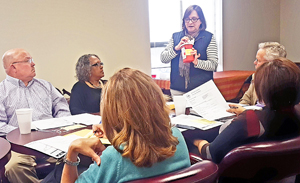Lincoln syringe exchange to be modeled after Mercer County program
Published 9:06 pm Sunday, March 5, 2017

- Photos by Abigail Whitehouse The Lincoln County Board of Health hears from Mercer County Health Department Director Kathy Crown-Weber about the needle exchange program implemented in the neighboring county.
STANFORD – With the necessary approval gathered, members of the Lincoln County Board of Health are moving forward finalizing details for a needle exchange program – but first they heard from a nearby county who has already put one in place.
Mercer County Health Department Director Kathy Crown-Weber distributed a packet of information and discussed the harm reduction syringe exchange program that was put in place in Mercer.
Crown-Weber said a public forum was held initially to seek out information and hear the public’s opinions on exchange programs.
“It was at this meeting that I found out why our sheriff (Ernie Kelty) was so supportive,” she said. “Our sheriff had apparently been at a park with his son and grandson and here they are walking and the grandson comes up with a bag of syringes – his two-year-old grandson.”
The sheriff attended the forum and offered his public support for a program. At the same meeting, Crown-Weber said she realized addiction can affect anyone of any socioeconomic status after hearing from a former nurse who developed an addiction problem after a car wreck.
“She said ‘I want you as a community to know that the people out there who are using are not the people you think they are. They are not predictable. They are not the low-life scum like you think. They’re people like me and I need you to be helping people like me,’” Crown-Weber said.
Mercer County first approached their local Agency for Substance Abuse Policy (ASAP) which agreed to fund the first year of syringes, the cost of which was estimated at about $3,852.
Crown-Weber said she underestimated the extent of the drug problem when preparing a budget for the program.
“Aug. 1 we started thinking 10 – we are up to 43 as of yesterday morning,” she said. “I want you to hear me when I say the average age is maybe 35 to 40. They are not who I thought they were going to be. I have seen a fellow walk out more than once time in a Vietnam veteran hat.”
The Mercer County exchange is available during the regular health department clinic hours and has been funded by their local ASAP up to this point.
“We have ASAP money coming for three years,” she said. “My goal is not to use local money because we didn’t budget for it and if I can get someone else to pay for it, I’m going to.”
People are called back to the clinic by randomly assigned county names, rather than their true names and anonymity is maintained using confidential client self-referral forms, she said.
“Because we are doing this anonymously, they simply have to ask the clerk for a confidential services form,” she said. “Eventually we want them all to be confidential services with registration because we can’t do hepatitis C testing without knowing their name. We can do free HIV tests and needle exchange without knowing their name but the rest we really want to know your name so we can chart. And we have people who have made it to that part.”
Rules and guidelines are laid out during the first visit and the Mercer Health Department asks that no drugs be used on the premises and no needles be shared with anyone else.
“The last page is our checklist which is essentially making sure that we’re offering as many things as possible,” she said. “We are asking them for some data – when were you born, male or female, how often do you inject?”
It was at least three months in before the program had more people from Mercer County participating than any other county, but that didn’t surprise her, she said.
“Our clerks grew up in our county and know a lot of people so it is kind of hard to be anonymous where you live and therefore I would ask you not to exclude out-of-countiers simply for that reason,” she said.
Mercer’s program offers unused insulin needles, Crown-Weber said, and while language in the legislation is supposed to prevent needles with proper program designations from being seized, that hasn’t been the case.
“Many of our needles are impounded at Mercer County and Boyle County and therefore we can’t get them back,” she said. “So I don’t really want to restrict people to if they don’t come back with a needle, then we don’t give them one because that’s generally why they don’t have them. They were seized and are now evidence.”
Board of health member Eric King inquired about the educational portion of the program.
“We speak to HIV and hepatitis C which is our main focus as public health,” she said. “They start with that. We talk about rehab and give local rehab numbers. There are people in Harrodsburg who will come and pick them up if they decide right now to go to rehab.”
Crown-Weber said the educational portion is about 15 to 20 minutes of discussion.
“The other reason I feel good about doing this when we’re open is that there can be no surveillance,” she said. “The counties who only do it for a little bit… who wouldn’t sit across the street in a squad car looking to see who comes. Because we are open all the time, they can’t do that. They walk in the door with everybody else.”
The public response has been more accepting of the program than expected, Crown-Weber said.
“No one wakes up in the morning and decides I’m going to be an addict because I can get free needles. That is not how it works,” she said.
Board of Health Chairman Rod Bates said he believes the board needs to move forward quickly and what Mercer County has put in place seems reasonable.
“We are probably going to have some negative feedback because of people out there who will…judge. But our goal is to try to help these people and we obviously want to do everything we can to reduce the instance of new HIV and hepatitis C. That is tremendously important to the community,” Bates said.
King asked Lincoln Health Department Director Diane Miller if the personnel needed was in place.
“I already decided what would be the best day for us because I had already spoken with our nurses and said we would do it within the time frame of our clinic hours, so yes, we will be fine,” Miller said.
As far as funding, Crown-Weber suggested looking to the local ASAP board.
“I’m on the ASAP board and we do have some dollars in our budget that the state called undetermined. They may be able, as a board, to look at that and maybe allocate some of the undetermined money toward our needle exchange program,” Miller said. “We meet again next month.”
In six months, Crown-Weber said Mercer County has only spent $3,000.
“And that’s for quadruple the number I thought,” she said. “We’re not talking a whole lot of money.”
The board voted unanimously to move forward with Lincoln County’s syringe exchange using Mercer County’s program as a model.




